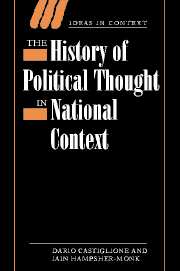Book contents
- Frontmatter
- Contents
- List of contributors
- Preface
- 1 Introduction The history of political thought and the national discourses of politics
- 2 The voice of the ‘Greeks’ in the conversation of mankind
- 3 History of political theory in the Federal Republic of Germany: strange death and slow recovery
- 4 A German version of the ‘linguistic turn’: Reinhart Koselleck and the history of political and social concepts (Begriffsgeschichte)
- 5 One hundred years of the history of political thought in Italy
- 6 Discordant voices: American histories of political thought
- 7 The professoriate of political thought in England since 1914: a tale of three chairs
- 8 The history of political thought and the political history of thought
- 9 The rise of, challenge to and prospects for a Collingwoodian approach to the history of political thought
- 10 Towards a philosophical history of the political
- 11 ‘Le retour des émigrés’? The study of the history of political ideas in contemporary France
- 12 National political cultures and regime changes in Eastern and Central Europe
- 13 The limits of the national paradigm in the study of political thought: the case of Karl Popper and Central European cosmopolitanism
- 14 Postscript. Disciplines, canons and publics: the history of ‘the history of political thought’ in comparative perspective
- Index
- IDEAS IN CONTEXT
2 - The voice of the ‘Greeks’ in the conversation of mankind
Published online by Cambridge University Press: 23 September 2009
- Frontmatter
- Contents
- List of contributors
- Preface
- 1 Introduction The history of political thought and the national discourses of politics
- 2 The voice of the ‘Greeks’ in the conversation of mankind
- 3 History of political theory in the Federal Republic of Germany: strange death and slow recovery
- 4 A German version of the ‘linguistic turn’: Reinhart Koselleck and the history of political and social concepts (Begriffsgeschichte)
- 5 One hundred years of the history of political thought in Italy
- 6 Discordant voices: American histories of political thought
- 7 The professoriate of political thought in England since 1914: a tale of three chairs
- 8 The history of political thought and the political history of thought
- 9 The rise of, challenge to and prospects for a Collingwoodian approach to the history of political thought
- 10 Towards a philosophical history of the political
- 11 ‘Le retour des émigrés’? The study of the history of political ideas in contemporary France
- 12 National political cultures and regime changes in Eastern and Central Europe
- 13 The limits of the national paradigm in the study of political thought: the case of Karl Popper and Central European cosmopolitanism
- 14 Postscript. Disciplines, canons and publics: the history of ‘the history of political thought’ in comparative perspective
- Index
- IDEAS IN CONTEXT
Summary
Canonical difficulties
Having recently completed two volumes treating those political theorists who are most frequently discussed in university courses dealing with the history of Western political thought from the ancient Greeks to the sixteenth-century Renaissance, I have been aware, from the beginning, of being faced with a number of problems that required resolution. During the past thirty years we have witnessed methodological debates concerning the proper way to study the history of political thought. Questions have been raised as to the very nature of a discipline that seeks to study political theorising as an activity that depends on its being engaged at discrete and contingent historical moments. In effect, this raises a very old question: is political theorising a cognitive activity of agents who, as a consequence of their socio-historical contexts, must engage a prudential form of reasoning in what are always taken to be changing circumstances? Or is political theorising some timeless activity of minds engaged in clarifying a necessary and unchanging truth about politics that is judged to be somehow independent of the particularities of agents' lived lives and the conventional languages they use to reveal their thoughts about it? In what follows, I propose some of my own conclusions in response to questions concerning what we should take the history of political thought to be for us today, why political theorising is thought to have a history, and of what it is a history. In consequence, I propose what appear to me to be the most satisfactory methods of studying old texts that are held to be important, not least because they reveal a variety of paths taken on the winding road to ‘state’ formation in the Western European tradition.
- Type
- Chapter
- Information
- The History of Political Thought in National Context , pp. 10 - 39Publisher: Cambridge University PressPrint publication year: 2001

